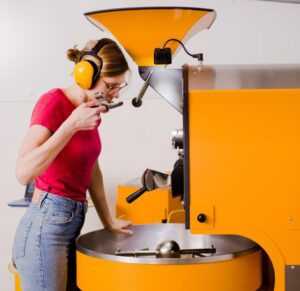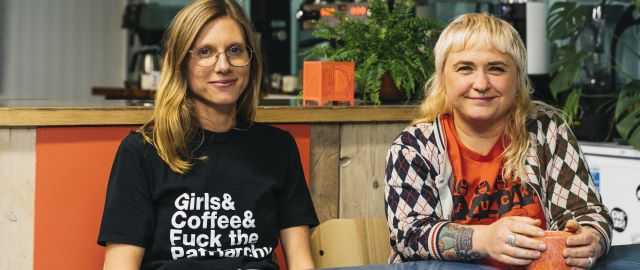MILAN – Today we go to the United Kingdom, where two women who are passionate about coffee have created their own women-owned business: Girls who grind coffee, is the social project that revolves around the bean from its origins to the final consumer, born in 2017 by the joint effort of Casey and Fi.
How did it all begin? Who are these two Girls who grind coffee?
“I want to have a coffee business for a long time. In University I studied sociology and became in the fair trade and social site of coffee. I started working in a roastery in Vermont in 2006 and I just fall in love with green coffee. I got a glimpse into what it was like working with producers and I knew that I wanted to have a business that incorporated more social aspects into it.
I moved to the UK with the dream of opening my roastery, but I had my two babies and I stopped working for a few years. Then I met Fi, through our children: we got talking about what we wanted a business to look like we both agreed to focus on women. For both of us, it was a really important aspect because coffee is so male-dominated. We came up with the idea of collaborating exclusively with women producers and we buy exclusively with them. We want to make more visible women in this industry.
We would really want to open a coffee shop but for now, is all sales and retails online all over the UK and we send some coffees through Europe as well.”
A phrase that really struck me in your presentation is We are two things. Pro-coffee and anti-patriarchy: can you share your vision

“We love coffee. Fi was also passionate about coffee: she owned a coffee shop in Melbourne and she loves coffee culture. She worked also in marketing and branding, which is very useful for business. So we know that we could do a good team. Within 6 months we talked, we had a roaster and a space, and it all happened quickly. We came across some road blocks, we found that being a woman and a business you need to prove yourself a little bit more.
I feel like if you’re a man and you want to open your roastery, people just assume
that you know what you’re talking about. I think that we fought to prove that we know it too. We think things a little bit differently: I think that the quality of what’s in your cup is only an element that defines the quality of a hall. You can’t look at what’s in the cup without looking at the human side of it. I don’t like the two things going too separated as normally I feel they are. Before we find producers to work with before we taste our coffee, we never buy the spot from importers and we always know who we’re buying from before hands.”
Your direct network with farmers, how did you build it and how far has it extended?
“In the beginning, googling female producers, I was looking on importers’ websites, and I met importers during trade shows. They connected us to the first coffee producers we bought. Eventually, we got an email from Carla Boza from El Salvador: her family was selling their coffee and they were told that wasn’t of good quality they paid less for their product until they decided to send it for an evaluation and found that it was
specialty coffee.
Then, they googled their farm name, finding that under their brand, their coffee was sold
as a specialty coffee at a higher price. So they knew that something has to change, searching for minded roasters and selling to them directly. They sent us some samples personally from their farms and we worked with an importer in the UK that let us split the coffee in containers. And we’re working like that for 5 years. Then we had other emails from producers and now we’re buying from El Salvador, Costa Rica, Honduras, Colombia and Rwanda.
We try to buy more volume from the same producers every year. We feel that is the most sustainable way to buy coffee. The reality is that lower-scoring, more volume coffee is what is keeping producers financially alive. We get 10% of our retail sales about 2hundereds 50 bags directly going to the producers: it’s our cheek-to-cheek program. It’s not questions asked about business compensation for the use of your name, your story, or your farm. Because I feel that in an ideal world, producers should be able to charge people for using their photos and products. At the end of the day we’re using producers for making money, it needs to be equal between the two parts.”
Are the women with whom you collaborate manager, peackers?
“That’s one of the questions that I’m going to ask in my case study: what does define a woman producer? What does that mean? Some of the producers are owners of some hectares and they do all the work. We work with manager women in Colombia. A few of them are the daughters of the owners and they’re running marketing. What’s the difference between the roles? It’s not so clear right now. We just want to enlighten the work that women are doing there. This is the important thing”.
A significant story about them that comes up in your mind?
“All the producers we work with are inspiring. This year we could visit Honduras and we met Gloria Hernandez, she owns a small product land. We’ve bought from her for 3 years. She’s incredible: her husband left years ago to find another job – another huge problem – she has a small and she supplements income with chickens and she also runs a little shop out of her house. A lot of producers don’t survive only on coffee and they need to make other crops and other means of income. It was amazing to see her and to
hear about all of the hard work she had to put into coffee.
And then, we visited on the other side a massive farm in Brazil. To see coffee on that scale was incredible. They are doing so much research on their farms, carbon project, on climate change, they’re doing experiments with processing and they’re investing so much into their future. It was inspiring to see their passion. And it’s possible to make high-quality coffee on bigger farms. Seeing the mechanical peaking in person, how the machines work, it’s incredible. It makes you appreciate more the coffee that we’re drinking and to work better.”
Is it difficult to get your message across for a more equitable supply chain?
“It is. Sustainability is such a buzzword right now. We don’t have any standards for consumers, and people can just put whatever they want in their label or packaging and people can believe it or not. So I’m taking Sca coffee sustainability course, and I’m going to finish the professional level. I’m going to implement my sustainability project, where I’m going to use our “Girls who grind coffee” as a key study. I’m going to ask the question: who is it benefitting? Only the buyers’ hands? The producers? Are we have an impact on their side?
We want to know for good what we’re doing, not being only a company that’s claiming to act sustainably. We want to make a real difference and new collaborations, but moving away from those sustainability projects that are top-down: so much of people of the global north telling to people of the global south population what their problems are and how they need to do to fix them. We want to work together, making a real conversation.
Often that’s a huge problem with sustainability. It doesn’t account for intersectionality. We talk about a lot of indistingueshly and improving producers together as they’re one. Each country is different, each regions different. The fact, the idea, that someone just doesn’t live in those countries, making up regulations for certifications it’s kind of ridiculous.
And then environmental sustainability is of course the main hot topic right now because of climate change. It overshadows the social aspect of sustainability, but really, I think that any sustainable projects should take into consideration environmental, social, and economic pillars.”
You have also made a particular choice for the specialty world, which usually pushes for very particular flavors and pronounced acidity: what can you tell us about that?

“I like roasted fruity coffee sometimes, but I also feel that coffee should be accessible. If we sell only to a small portion of the population, that’s not anyone any favors. We want to make coffee approachable and accessible. That means developing our coffee a little bit more when we roast, which makes it more balanced and sweeter. They’re always developed enough so that a person that is not used to specialty coffee, wouldn’t put them off.
I thought also to add Robusta in: there’s a lot of talk about Robusta that is amazing, so hopefully in the near future, I would experiment. We also do blend, and it’s for the espresso: Brazil, El Salvador, from Carla Boza and Ana.”
What are the next steps for Girls who grind coffee? How do you expand your rebels following?
“The café would be amazing, having a space where the community can come in. We can make a real experience like coffee drinking should be. We would like to have a place to make events, make them even more. And it could be also an opportunity to create more jobs for women in our area and to get more women also into roasting if we had a bigger location. For now, we’re working with a 6-chilos Giesen and we called it Aunt Edie as an omage. When we started the business with have a family loan and it was money
from a woman called Edie. When she was alive she was one of the first women to work for tv.
She was a businesswoman in the UK who never had children and I think she would approve of how her money was invested in this kind of female company. And in the end, personally, doing the sustainability course and asking the right questions, changing the things that we need to change. Thinking about how we can make things more intelligently. We’re trying to learn. I would love to grow and be able to buy from more producers, but for now, we’re going to buy more coffee from our women producers as well. “















